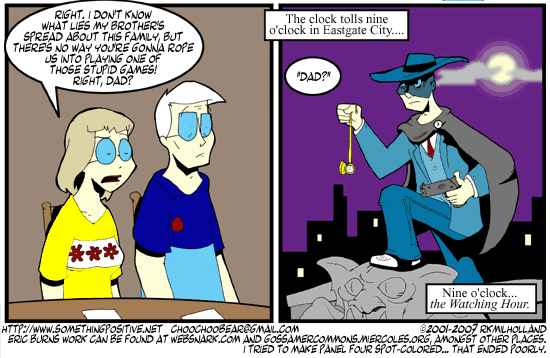For the Honor, and Media Influence
When thinking about media influence in RPGs, the obvious first step to take is to look at games like For The Honor.
No, that’s not accurate. The most obvious step is to look at officially licensed RPGs based on IPs like Star Trek, Lord of the Rings, Lord of the Rings again, Doctor Who, Sailor Moon, Highlander, Steven Universe, and many more. Those are systems for creating stories in established canons — what we could uncharitably call the RPG equivalent of fanfiction.
But I want to talk about games that are one step removed; games with the serial-number filed off, based on IPs like The Prisoner, Yu-Gi-Oh, Annihilation, Annihilation again, Doctor Who, Sailor Moon, Highlander, Steven Universe, and many more. And that’s just RPGs based on visual media; I’ve already touched on RPGs based on video games, and that list was hardly exhaustive.
What makes For The Honor interesting is that it is less a free-form RPG where you can create your own adventures, and more a scripted performance where you and your personae act out the roles you’ve created. Composed of 12 sessions, it’s similar to King is Dead, though you are given more freedom in creating and defining your own persona.
For The Honor, as should be obvious to anyone familiar, is based on She-ra and the Princesses of Power in the same way that a photograph of a tree is based on a tree. It’s a carbon copy in all but name, changing just enough to avoid copyright. It is a build-your-own-She-ra. A color-between-the-lines adventure.
And I don’t want to give the wrong impression, I am in no way slagging the game off for this. While that first list of RPGs could be fan-fiction for IPs, the second list is…well, I suppose it’s also fan-fiction of a kind; a one-step removed kind, fueled by a need to slake a creative instinct while being “original.” After all, these days originality only exists because there isn’t enough time in the day to consume everything available to us. If you’ve never seen She-ra, For The Honor would seem impressively creative and unique.
Heck, looked at from that angle, D&D is in the exact same boat as a pastiche of Tolkien’s work. “Hobbits, ents, and balrogs? Never heard of them. These are called halflings, trents, and balors.” (At least, they were ever since the lawsuit)
But regardless of its uniqueness or lack of “pure” originality — whatever that means — there is nothing wrong with showing your notes. We do not choose what affects us, and the need to linger in a space which inspires us is not easily resisted, nor should it be.

I think these kinds of games are refreshing; an unapologetic admission that creating a “unique world” is of secondary importance to the stories that the players create. What makes For The Honor unique is its willingness to not only frame the game’s aesthetic in She-ra’s image, but structure as well; its sessions are lifted straight from the show’s episodes, including a princess ball where secrets are revealed, tense conversations where backstory is explored, rescues, arguments, will-they-won’t-theys, and climactic battles.
The fact is, the stories we tell — whether game- or meta-narratives — are shaped entirely by the stories we are told. It’s not hard to understand how RPGs based on books or movies or television come to be. Obviously there are the genre tropes and story parallels, but there are narrative structures as well. It’s not just what stories we tell, but how we tell them.
There are games that are like Lost: you start the game not knowing where to go or what to do, and the GM lets the other players take the lead while filling in clues and hints throughout the adventure, slowly shaping something like a coherent narrative from the improvised story beats the players provide.
There are games that are like Babylon 5: Generally light, but rich with established backstory that the players can interact with as they choose, finding moments of levity and solemnity in their journey.
There are games like Power Rangers: simple fantasies of mighty heroes fighting villains without moral ambiguity.
There are games like Dark: Bleak as all get-out.
It’s always fun when a system gives thanks to their predecessors. There are games out there that list seven or eight other RPGs as inspiration, mixed in with a TV show or two. Most games have lists of books, movies, and even music for GMs to find their own inspiration for campaigns and stories to tell with the system. It’s clear evidence, if any more is needed, that the act of creation is less an ephemeral muse blessing someone with an polished gem, and more an tumultuous and incestuous orgy that someone had to clean up after.
But just because it looks that way doesn’t mean it is. It’s easy to fall into a trap of the strong-law-of-small-numbers. Is there really something valuable in drawing a comparison between episodes of a TV show and sessions of an RPG? Is it really meaningful that our narrative medias all tend to shape themselves similarly, or is it all an unavoidable coincidence due to the nature of telling stories in the first place?
I certainly don’t know. But I am interested in what it does, because if our stories follow patterns and rhythms that we find elsewhere in our media, then what happens when we separate ourselves from those patterns?
When we take off the training wheels of carefully crafted and familiar framings like For The Honor, when we tell stories without a net…what happens if we slip up? Is it possible to tell a story wrong?